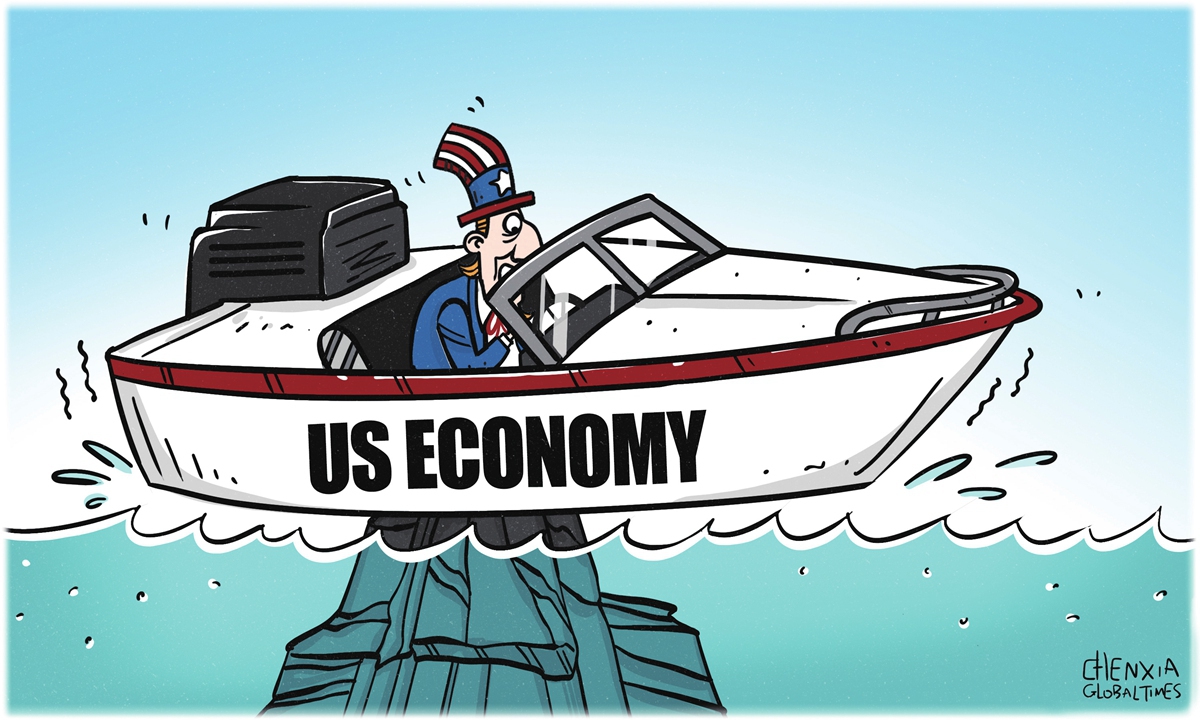Illustration: Chen Xia/Global Times For decades, the 10-year US Treasury bond has been seen as a safe haven in times of economic uncertainty and risky events. But now, even the risk-aversion sentiment associated with the deteriorating situation in the Israeli-Palestinian conflict has failed to stop US bond yields from soaring, and there's every reason to raise a red flag over the abnormal rate performance. Global markets are increasingly concerned about the creditworthiness of US bonds and distrustful of the US economy. The unprecedented mistrust threatens to trigger a storm in the dollar-dominated financial system. The yield on the 10-year US Treasury bond again increased above 5 percent on Monday, hitting a new high since July 2007 - just before the start of the 2007/08 financial crisis. Another crisis is brewing amid mounting worries over expanding US debt, and this concern has become a hotly discussed topic in global financial markets. While Federal Reserve Chair Jerome Powell said last week that the US economy's strength and hot labor market might warrant tighter financial conditions, offering an explanation for the quick rise in long-term US bond yields, investor fears over still high inflation and growing US debt seem to be the most likely cause of the unusual surge in the long-term bond market. Whatever the reason, investors' demand for record high yield compensation on long-term US Treasury bonds could be a sign that the US economy is one step closer to a devastating crisis. And it is the time to prepare for the big storm by making use of the existing Asian and BRICS financial coordination mechanisms. Looking at the US bipartisan budget battle a few weeks ago, one could find that some of the biggest market fears have gradually materialized. Political chaos in the US is certainly one of the reasons for the failure to reach a deal on an annual budget. But more importantly, the US debt has exceeded $33 trillion, and the federal government has no credible plan to rein in the expanding debt, let alone reduce it. The US government last week posted a $1.695 trillion budget deficit in fiscal 2023, a 23 percent jump from the previous year. Apparently, the recent rise in bond rates reflects the worries of investors, who see the US trapped in a vicious cycle of "deficit leading to debt issuance, debt liquidity requiring high interest rates, high rates causing a deteriorating deficit." Even if investors do not demand higher interest rates, given the fact that the US debt has already become the biggest threat to the dollar's status, keeping interest rates high is also a must for the US to safeguard the dollar's status. Needless to say, it is a dangerous gamble, which means that the US is betting everything on inflation being brought under control in the short term. But things are looking the opposite. The sudden conflict in the Middle East has led to higher oil prices, heightening inflation fears. That makes US debt look even more unsustainable. Now higher interest rates may lure more funds into US bonds, but this will further drive up borrowing costs and increase the risk of an economic recession. Moreover, high rates will inevitably lead to an outflow of funds from other markets, causing more shocks to the global financial markets. The Wall Street Journal said in an article on Monday that South Korea's "economy has fallen victim to the rapid rise in US interest rates." Among all the Asian economies, South Korea is relatively resilient and strong. If South Korea finds it hard to defend its economy, currency and liquidity under the US high interest rates, then one can only imagine what shocks await other Asian economies and emerging markets. Under such circumstances, it seems reasonable to be concerned about whether there will be a repeat of a financial crisis, calling for financial coordination on an urgent basis among Asian and emerging economies. For instance, Asian countries can strengthen financial cooperation and coordination under a regional cooperation mechanism such as the Association of Southeast Asian Nations or the Chiang Mai Initiative when it comes to spillover effects from a US crisis. In addition, the BRICS countries can deploy emergency foreign exchange liquidity support through the BRICS Contingent Reserve Arrangement to address financial market instability.
GT Voice: US Treasury yield signals economy in ‘vicious cycle’
Editor:谭婕倪
Source:globaltimes.cn
Updated:2023-10-25 15:18:15
Source:globaltimes.cn
Updated:2023-10-25 15:18:15
Special
Contact
Welcome to English Channel! Any suggestion, welcome.Tel:0731-82965627
lisl@rednet.cn
zhouqian@rednet.cn











